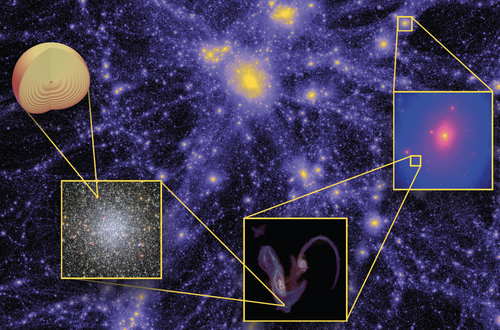Overview
Find out about the objectives, research areas and career prospects of the PhD programme.

Vision and goals
Our PhD program in Astrophysics focuses on training students in the most advanced areas of astrophysical research, encompassing both theoretical/modeling and experimental/observational aspects. Depending on their thesis project, students are immediately integrated into research groups where they receive training in the acquisition and subsequent analysis of observational data from top international instruments across various bands (optical, millimeter, radio, X-ray, ultra-high energy).
Training and skills
Depending on the specific research project and theme, students are trained on the one hand in the acquisition and subsequent analysis of observational data obtained from the best international instruments in the various bands (optical, millimetre, radio, X-ray, ultra-high energy), and on the other hand in the development of numerical codes and models and/or astrophysical instrumentation, thanks to their immediate inclusion in research groups.
In addition to carrying out an individual research programme under the guidance of a supervisor, the training programme includes teaching and training activities that complement the research activity.
These include:
- specialised courses on advanced astrophysical issues, in particular on rapidly developing topics.
- weekly seminars jointly organised by the Department of Physics and Astronomy and the INAF OAS and IRA. -
- courses functional to both research activities and their dissemination. These include transversal activities designed to improve both the set of 'soft skills' (public presentation, academic writing, job orientation skills,..) and the refinement of programming techniques and advanced statistical methods in collaboration with CINECA.
A fundamental part of the training involves writing scientific articles and work reports, publicly presenting their research results, and drafting proposals for numerical and/or observational time. Doctoral students also gain essential knowledge about the national and international research funding systems.
PhD students are also engaged in the design and implementation of innovative forms of scientific communication.
The research environment
The Department of Physics and Astronomy at the University of Bologna, together with the adjacent INAF-OAS and INAF-IRA, offers a lively and inspiring environment.
Over 100 academic and research staff are involved in astrophysics research spanning all scales, actively contributing to theoretical, computational, and observational astrophysics, as well as astronomical and space technology .
Our staff is involved in several international projects with world-class observing facilities and space missions:
- HST
- ESO VLT
- JWST
- Gaia
- Chandra
- XMM-Newton
- NuSTAR
- ALMA
- LOFAR
- SKA
- VLA/VLBI
- Fermi
- Euclid
- ATHENA
- PLATO
- CTA
- Einstein Telescope
Prospects
Upon completing their doctoral studies, PhD graduates in Astrophysics will be qualified to conduct:
- Teaching and research activities at universities and in national and international research organisations, as well as in the industry;
- Teaching and training activities in lower and upper secondary schools for mathematical and physical subjects;
- Activities related to software development for companies and public and private research organisations;
- Activities related to scientific publishing, in particular astrophysics, data science, artificial intelligence and space missions;
- Research and development activities in private and public organisations for the management of large databases;
- Analysis and forecasting of complex systems in public and private organisations; - Analysis and management of systems using artificial intelligence for companies and public and private bodies;
- More generally, research, innovation, training, production, forecasting and prevention activities in the service and advanced service sectors.
Highlights
-
PhD programme & doctoral credit table
How PhD programmes are organised and programme’s doctoral credit table